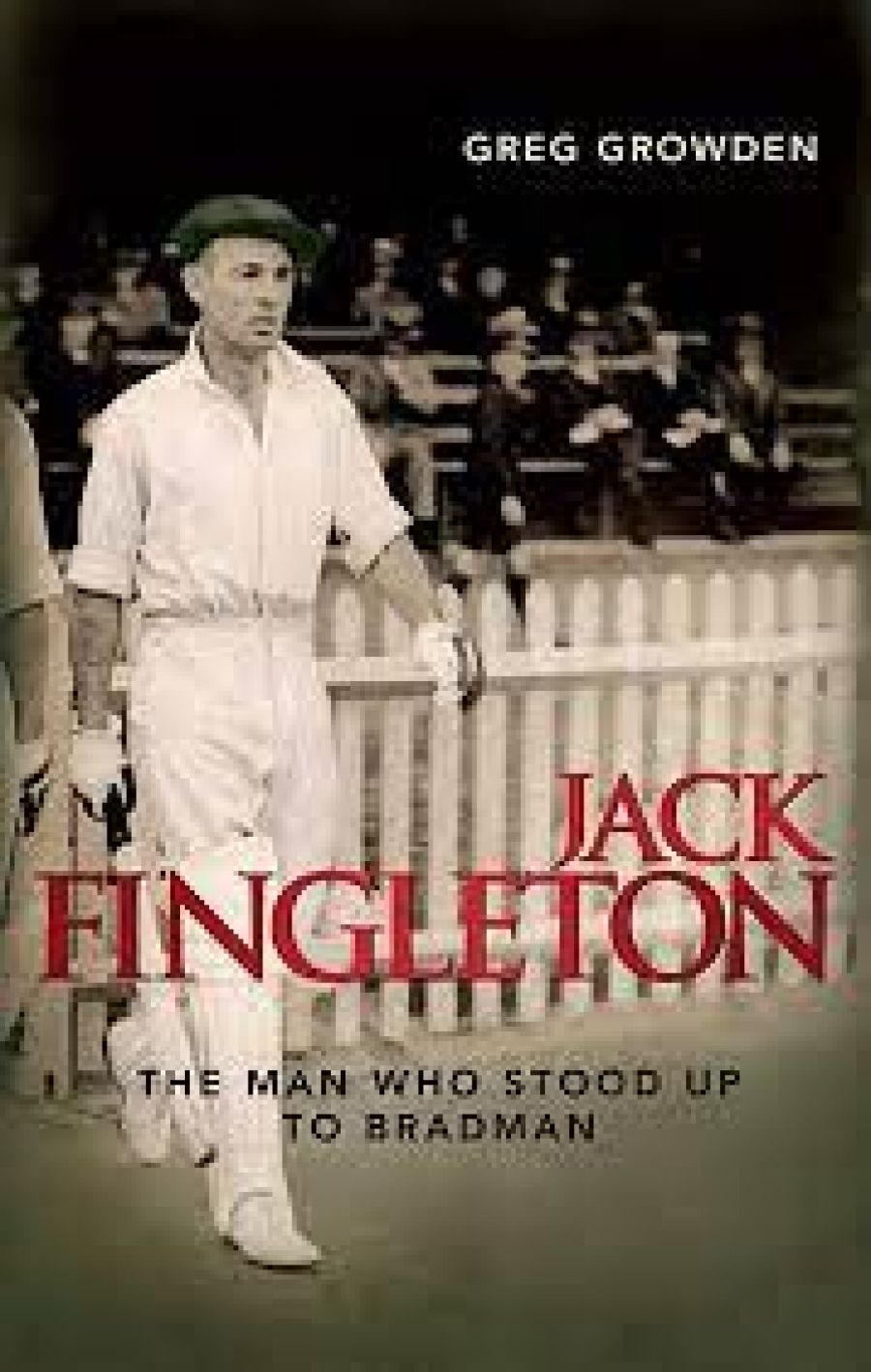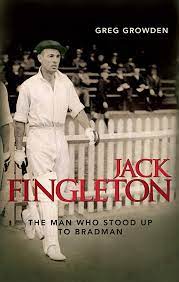
- Free Article: No
- Contents Category: Biography
- Review Article: Yes
- Article Title: Get over him!
- Online Only: No
- Custom Highlight Text:
In an age when cricketing biographies predominantly lionise one-dimensional and vacuous individuals, this is a pleasurable reminder of an earlier era when even test players had regular jobs and a better sense of balance about life’s priorities.
- Book 1 Title: Jack Fingleton
- Book 1 Subtitle: The Man who stood up to Bradman
- Book 1 Biblio: Allen & Unwin $39.95 hb, 311 pp
- Book 1 Cover Small (400 x 600):

- Book 1 Cover (800 x 1200):

Jack Fingleton played first class cricket for New South Wales between 1928–29 and 1939–40, and eighteen tests between 1932–38, though he was omitted from the tour of England in 1934. There were five centuries among his 1,189 test runs, scored at an average of more than forty-two. In sports jargon, he could play. Simultaneously, he developed a journalism career marked by a good nose for a story and a dollar. The cricket-writing combination immediately distanced him from Bradman. The Bodyline series of 1932–33 scarred both men, each accusing the other of ‘leaking’ the story about how the Australian captain, Bill Woodfull, castigated England’s manager, Pelham ‘Plum’ Warner. Fingleton retired from cricket to become a Canberra press gallery fixture and a leading international cricket writer.
The Irish Catholic son of a New South Wales Labor politician, Fingleton married Philippa Street, daughter of the reforming Jessie and New South Wales Chief Justice Sir Kenneth Street. He worked for Billy Hughes and mixed with Ben Chifley, Robert Menzies and William McMahon, his cricketing status providing an ‘in’ for his political reporting. One of those Australians more appreciated inter-nationally than in Australia, later in life Fingleton became a loved regular on Michael Parkinson’s television programme, the archetypal laconic Aussie with sharp, dry wit and quick responses.
If Fingleton could bat, Greg Growden can write. Not as sensational as his earlier biography of Leslie Fleetwood-Smith (1991), the legendary spin bowler and seducer become derelict, Jack Fingleton: The Man Who Stood up to Bradman is more important because it is about a man in the middle of things and reveals the complex personal rivalries that pockmark sport’s playing and administrative quarters. Growden recounts the life at good clip, marvellous anecdotes demonstrating attitudes and outlooks. One is the reminder that Ian Johnson, a spinner not admired by ‘Fingo’, was known universally as ‘Myxomatosis’ – he would only bowl at ‘rabbits’ (tail-end batsmen). Another is the lovely scene where Fingo ‘interprets’ for Chifley and Harold Larwood when the Yorkshireman arrives in Australia as a migrant – neither could understand the other without Fingo. In one interesting section, Fingleton and Menzies discuss apartheid and lament the call for sports boycotts. Fingleton was no radical, despite his famous mother-in-law. The sprawling Fingleton archive bedrocks the book, but Growden broadens that with insights from family, friends and foes, including the wonderful Rob Chalmers, another long-time Canberra gallery man and Royal Canberra Golf Club colleague.
While he holds little back, including on Fingleton’s marriage breakdown, Growden lets readers reach their own conclusions about Fingo the person who knew many people but had few friends apart from Bill ‘Tiger’ O’Reilly, his fellow New South Wales and Australian team-mate, Catholic and journalist. Plainly, Fingo could both hold a grudge and slip in the dagger, thus alienating many people. He got on well with Neville Cardus, but had spiky, even poisonous, relationships with other cricket media figures, such as John Arlott and Alan McGilvray, as well as with several media employers. He was a driven man, devoted to family but allowing his work and, let it be said, his personal crusades to dominate. Ironically, he spent considerable time with Menzies because he thought the prime minister ‘lonely’.
Much of all that can be traced to Fingleton’s obsession – his non-relationship – with Bradman. (Paradoxically, the book’s back cover depicts Jack and the Don going out to bat, apparently trouble-free). It took a long time for Bradman’s glittering, pristine reputation to be dented, frustrating men like Fingo and Tiger who felt betrayed by their captain as men, players, administrators and writers. Bradman’s long-muttered-about disdain for Catholics gets good coverage here, as does the great man’s predilection for political expediency whenever cornered and his keen eye for commercial opportunity.
Given that, the book’s subtitle might as easily be ‘The Man Fixated By Bradman’. Even his great mate O’Reilly finally told Fingo the best thing to do was forget to Bradman and move on. Almost to the end, Fingleton fought to tag Bradman as the man who provided the Bodyline leak, who caused him to miss the 1934 tour, who bad-mouthed him to all and sundry, and who never knew the harm caused to Fingo and friends. There is a sadness in Fingo’s need to pur-sue Bradman, almost as a means of justifying himself and rectifying wrongs, real and imagined, committed long in the past. Growden understates it nicely, but there is a sense of loss here. Jack Fingleton did many other great and interesting things besides play cricket, but he never got over Bradman.


Comments powered by CComment